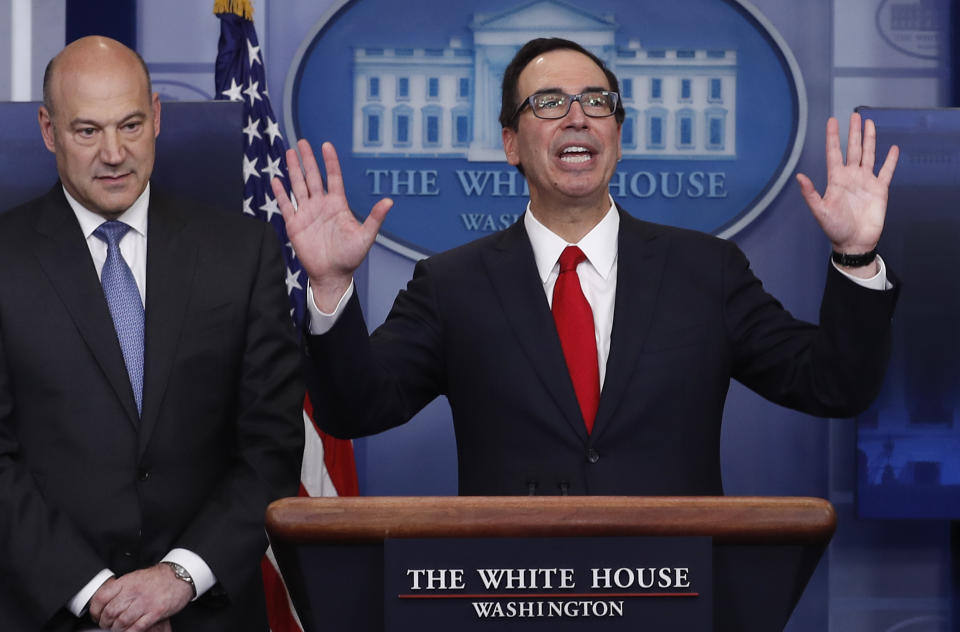Three sectors with the most at stake under Trump's tax plan

As analysts parse through the White House tax plan revealed Wednesday by Treasury Secretary Mnuchin and White House chief economic adviser Gary Cohn, industries are already reacting to the different proposals.
Core elements of the “biggest tax cut” in US history plan include a reduction in the corporate tax rate to 15% from 35% and reducing the number of personal tax brackets from seven to three, with the top bracket going down from 39.5% to 35%.
But it’s the details that are moving sectors.
WINNER: Retail
Specifically, Trump’s plan did not include a border-adjustment tax (BAT) proposal, which was included in the Paul Ryan-backed House GOP plan released in June.
Retail companies, which reacted negatively to Ryan’s original proposal, are happy about the lack of a border tax on imports. The National Retail Federation on Wednesday expressed support of Trump’s proposal.
“Retailers commend the president for his leadership on much-needed comprehensive tax reform,” NRF President and CEO Matthew Shay said. “What matters most is that we enact pro-growth tax policy for both individuals and businesses. This puts money back in the pockets of hard working Americans, helping to grow businesses and industries in the communities where consumers live and work.”
Shay commended the proposed lower corporate tax rate, highlighting that retailers pay the highest effective tax rate of any industry. And he added the key is not including the border adjustment tax.
“We are optimistic that when tax reform does cross the finish line it won’t include a border adjustment tax or any other scheme that shifts the financial burden to consumers,” he said. “Taxing imports would not only raise prices for consumers, it would ultimately cost American jobs and shutter American businesses.”
Retailers, including JC Penney (JCP), Target (TGT) and PVH (PVH) have been vocal about the negative impact the tax would have on their business, particularly affecting their supply chain and potentially leading to bankruptcies.
LOSER: Housing companies
While the White House maintained tax deductions for mortgages (along with charitable giving) while cutting all the rest, it also doubled the standard deduction, so married couples won’t pay taxes on the first $24,000 they earn.
Realtors and home builders expressed worry about the impact of Trump’s proposal on their industry.
The concern? Trump’s proposed increased standard deduction would actually dampen home buying plans of lower- and middle-income Americans. The industry says the higher level of the standard deduction incentive would diminish the importance of the mortgage deduction.
“Doubling the standard deduction could severely marginalize the mortgage interest deduction, which would reduce housing demand and lead to lower home values,” said Granger MacDonald, chairman of the National Association of Homebuilders (NAHB).
If that were the case, the growth and profits of homebuilders like Pulte (PHM) and Lennar (LEN) would be impacted
And the National Association of Realtors (NAR) said the tax plan is a “non-starter” with the real estate industry.
“By doubling the standard deduction and repealing the state and local tax deduction, the plan would effectively nullify the current tax benefits of owning a home for the vast majority of tax filers,” said NAR’s President William Brown.
“As it stands, homeowners already pay between 80 and 90 percent of US federal income tax,” Brown said. “Without tax incentives for homeownership, those numbers could rise even further.”
WINNER: Tech companies
Technology companies—which have the most cash overseas—have posted strong growth since Trump’s election, partly out of an expectation of repatriation of cash overseas at a lower rate, according to analysts.
US companies currently hold over $2.5 trillion in cash overseas, with technology companies holding 41% of cash overseas.
With the Nasdaq hitting new highs of 6,000, companies like Apple (AAPL), Microsoft (MSFT), Alphabet (GOOGL), Cisco (CSCO), and Oracle (ORCL) would see a benefit of being able to bring that cash onshore at a lowered rate.
That said, near-term uncertainty remains. In fact, tech companies with large overseas cash hordes like Apple actually initially fell when Trump’s plan was released. According to some analysts, this drop was because the tax blueprint did not specify a rate for the repatriation and only said the plan would include a “one-time tax on trillions of dollars held overseas.”
Mnuchin said the actual rate has yet to be determined and that the White House is working with Congress on a repatriation rate.
Mnuchin did add the rate would be “competitive,” perhaps justifying a lot of the positive momentum from the tech sector.
Nicole Sinclair is markets correspondent for Yahoo Finance.
Please also see:
White House unveils Trump’s tax reform plan
Citigroup CEO on Trump’s policies: ‘It’s a matter of when and not if’
